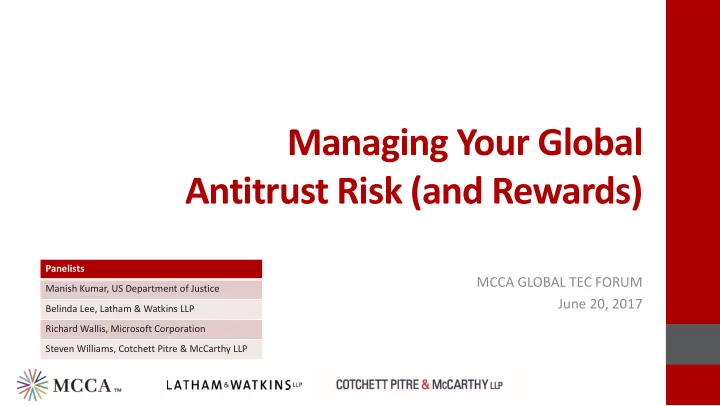

Managing Your Global Antitrust Risk (and Rewards) Panelists MCCA GLOBAL TEC FORUM Manish Kumar, US Department of Justice June 20, 2017 Belinda Lee, Latham & Watkins LLP Richard Wallis, Microsoft Corporation Steven Williams, Cotchett Pitre & McCarthy LLP
Agenda 1. Antitrust 101 2. Practical Tips 3. Managing Your Risks and Rewards Note: The views expressed do not necessarily reflect those of the United States Department of Justice
Background • Section 1 of the Sherman Act • Prohibits agreements that unreasonably restrict competition • Some agreements are “per se” → always illegal • Everything else is “rule of reason” → do benefits to consumers outweigh harm to competition?
Examples Of “Per Se” Illegal Behavior • Any agreement NOT to compete is “per se” illegal, including: • Price fixing (broadly defined) • Bid rigging • Allocating customers, products, or territories • Output restrictions • No defense to “per se” illegal behavior
What is an “Agreement”? • Does not matter if agreement is only verbal • Does not matter if agreement is ultimately ineffective or not even carried out • How do you prove an agreement?
Section 1 Enforcement (Civil) • Private plaintiffs (class actions, customers, and consumers) • Also DOJ, FTC, and State Attorneys General • Joint and several liability for treble (3x) damages • Attorneys’ fees and costs
Section 1 Enforcement (Criminal) • Individuals • Up to 10 years imprisonment, $1M in fines • Exclusion from US for minimum of 15 years • Possible arrest and extradition in other countries • Corporations • Up to $100 million in fines; or • “Twice the gain, twice the loss” • Compliance Programs and Monitors • Leniency Program = immunity for first to self-report
Conspiracies Come in All Shapes & Sizes • Increasing government and private enforcement of non-traditional conspiracies • Horizontal Conspiracies • “Hub and Spoke” Conspiracies • Other Conspiracies
Agenda 1. Antitrust 101 2. Practical Tips 3. Managing Your Risks and Rewards
Minimizing Contacts • Don’t talk with competitors about price (even generally) or specific customers • Can be legitimate, such as for industry benchmarking studies or merger due diligence; but, it can appear to be a way of monitoring adherence to a cartel • Never do it without the law department’s involvement • Don’t verify customer claims about competing bids • Do not contact competitors to verify that a customer is telling you the truth about a competing bid • It could be interpreted as coordinating • Note, information exchange is “per se” illegal in EU and elsewhere
What If Competitors Contact Me? • Explicitly reject any offers or invitations to fix prices • Even when rejected, this imposes risks on the company, so alert the legal department • e.g .: You are planning to raise prices, and a competitor suggests you should both raise prices by 10%. Now it looks like price fixing • Be careful of social interactions with competitors • These can lead to anticompetitive business discussions if you are not careful
What If The Job Requires Contact? • Discuss only what is necessary to do business • Don’t get into unnecessary discussions about the market, customers, input costs, other products • Avoid discussing non-public information • Keep notes about who attended, what is discussed • Make an agenda and create minutes of meetings • Politely, but firmly stop the conversation if necessary • Get legal department involved
A Few Rules of Email Practice The “New York Times” Rule • How would it look in a newspaper, devoid of context or explanation? The “Aging Humor” Rule • It's never as funny later on, even if plainly untrue or sarcastic The “Full Story” Rule • If you are collecting or passing along information from a competitor, always include your lawful source of the information Emails Last Forever • Assume everything you write will be read by the person you least want to read it
Agenda 1. Antitrust 101 2. Practical Tips 3. Managing Your Risks and Rewards
Managing Risks and Rewards • How does antitrust litigation differ from managing other types of investigations and cases? • How should companies evaluate whether to seek leniency? • How should companies decide whether to become antitrust plaintiffs? • What are the top mistakes that companies make in an antitrust case? What are the best practices?
Managing Your Global Antitrust Risk (and Rewards) Panelists MCCA GLOBAL TEC FORUM Manish Kumar, US Department of Justice June 20, 2017 Belinda Lee, Latham & Watkins LLP Richard Wallis, Microsoft Corporation Steven Williams, Cotchett Pitre & McCarthy LLP
Recommend
More recommend